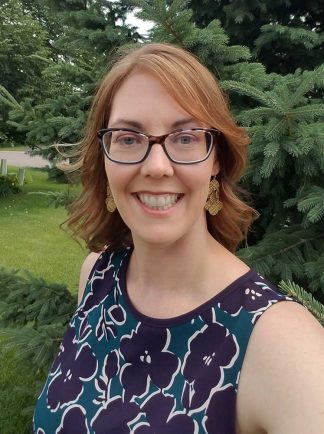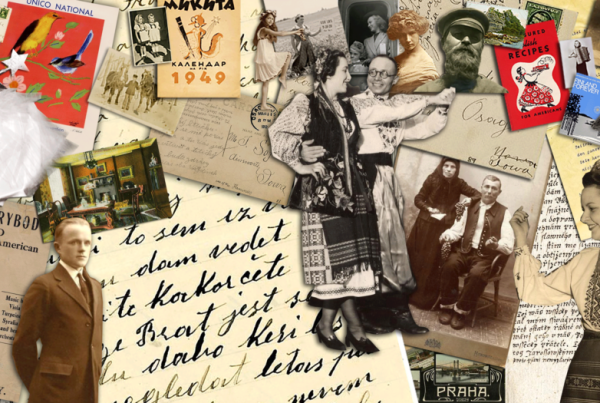By Allison Campbell-Jensen
University of Minnesota Extension professionals, located in each of Minnesota’s 87 counties, make an impact by translating research into real world applications for residents of the state. One of the pillars they can lean on is Outreach and Instruction Librarian Kristen Mastel.
She is energized by the variety of subjects Extension covers.
“It’s fascinating,” Mastel says. “One day, I might be looking at an agricultural topic like apples or forages, and the next topic, we’re talking about outreach with incarcerated parents building relationships with their kids or supporting tourism in a small town in Minnesota.” Connecting with Extension faculty and staff fuels her curiosity and love of learning.
Mastel also is the librarian for the College of Continuing and Professional Studies, Agricultural Education, Communication and Marketing, and the Institute on the Environment.
Early connection
Lisa Hinz, Extension Educator in Leadership and Civic Engagement with the Center for Community Vitality and office in Farmington, is one of the first people Mastel worked with in Extension when she started in this position in 2010.
A promotion initiative for educators was beginning and they needed help in documenting their program leadership, teaching, service, and so forth. Hinz was doing a webinar to support them, and Mastel joined in to show them how to start using the Libraries for their scholarship “with more rigorous intention,” Hinz says.
Hinz also has tapped Mastel’s expertise for a literature search that she needed for a conference presentation as well as help completing a chapter for a book. Mastel persuaded her to look beyond Google Scholar, opening up a range of resources.
“We have had this ongoing conversation about the library and her work,” Hinz says, “helping me to understand the breadth of things that are available.”
Mastel has presented at Extension’s annual conferences; Hinz praises her for not lecturing but rather focusing on experiential education — a fundamental aspect of Extension work.
“I remember one workshop she did about creating programs where ideas stick,” Hinz says. “She had so many neat activities for us to do during the workshop.” If her schedule allows, Hinz always signs up for Mastel’s workshops.
Connecting with youth
Recently, Mastel connected with Sutton Stewart, who has been an Extension Educator in the Center for Youth Development’s Moorhead office for about three years.
“I am working on a trivia contest program to be run by youth,” he says, which will promote their digital literacy and skills in managing an online event. “They’re being global citizens in an online environment.”
He wanted the young people to learn from Mastel’s expertise in evaluating sources of information and identifying which would be high quality. As the group’s guest speaker recently, she went over ways to judge the value of sources. Mastel says the experience was fun: “How do I research about writing trivia? I’ve never approached research through that lens before.”
Among other things, she introduced them to a statewide resource, the eLibraryMN databases, to help them in creating their questions. “She was also helpful in identifying some of the limitations of copyright in a public-serving organization like the University,” Stewart says.
Mastel wants to increase her involvement in the area of youth development for Extension, and seek more opportunities to reach the public incorporating resources like this in their workshops.
Connecting with family programs
“Give Kristen a call. … She’s responsive and relatable.”
—Lisa Hinz
Mary Jo Katras, Family Resiliency Program Leader in the Center for Family Development on the St. Paul campus, says Mastel is “wonderful.” Their center is dynamic, she says, always listening to the needs of families that they serve.
“We are always asking Kristen, ‘How do we do this?’ A lot of what we do is innovative and trying new things,” Katras says. “She is always happy to think things through, to have that conversation, to jump on Zoom.”
Mastel has been a constant support in their programming, Katras says, which includes family resource management, decision-making, financial capability, parenting, school engagement, pathway to post-secondary and, more recently, the opioid crisis and substance abuse disorders, and mental flourishing.
“Our mission within Extension is to support families,” Katras says, “and we also support communities by building capacity of community partners and practitioners.”
A few years ago, Mastel trained a team of Family Resiliency educators on how to use Wikipedia as a tool to highlight their expertise across various content areas, Katras says. “We are recognized as a trusted and accurate research-based source and this tool helped to raise up our work.”
Mastel also helped them organize their data in a way that creates a system that is not only efficient but also productive in getting that work out to communities and families. During the pandemic, Mastel also helped make their research, evaluation, and programming accessible online.
At the ready
One of the key projects with Extension began when they redesigned their website and a great deal of content that needed to move. Mastel worked closely with Extension staff, training them to transition materials to the University’s Digital Conservancy.
“Now, it’s the second largest collection in the UDC and one of the top used,” Mastel says. As Katras and team revise their seminal Dollar Works 2 program, they can move the original curriculum to the Conservancy to preserve its legacy.
Mastel is co-author with Extension staff on a paper under review on how Extension has used the Libraries to publish several e-books. She’s also consulted with Extension staff who are designing new workshops and has been written into one grant as a support. Every new person in Extension receives a customized email introduction from her, which helps build connections from the beginning. Since the majority of Extension staff work off-campus, Mastel had the knowledge and tools to effectively work remotely and has shared those strategies with her colleagues during the pandemic.
In other words, she’s flexible.
Hinz also serves on a professional association committee with Mastel; “I see her always connecting.” When other Extension staff ask about things that might use Mastel’s expertise, Hinz says: “Give Kristen a call. … She’s responsive and relatable.”
To learn more about Kristen’s outreach to Extension, you can read two articles she’s published.
- Haugen, I., Mastel, K., & Pfander, J. (2017). Librarians at Land-Grant Universities Working with Extension: Three Case Reports. Library Trends., 65(3), 378-395.
- Mastel, K. (2011). Extending our reach: Embedding library resources and services within extension. Embedded librarians: Moving beyond one-shot instruction, 211-218.




